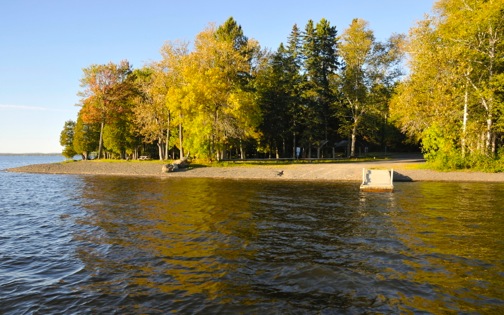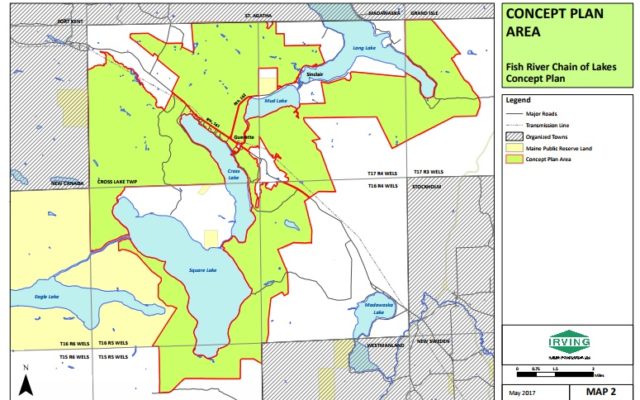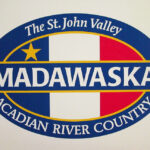J.D. Irving, Maine’s largest landowner, is asking the state’s Land Use Planning Commission to rezone 51,000 acres in the Fish River Chain of Lakes region as part of a plan that involves new commercial and residential development, conservation and continued logging.
Officials and consultants with J.D. Irving’s Maine subsidiaries outlined the Canadian company’s proposed “concept plan” for the Fish River lakes Wednesday at an LUPC meeting in Presque Isle.
“We really felt we needed a long-term strategic plan,” said Anthony Hourihan, Irving’s director of development. “We decided that the concept plan was the best tool.”
Concept plans are an alternative to the LUPC’s normal land-use regulations and allow landowners to create long-term plans for development or land management, according to the commission.
Irving owns 1.3 million acres of Maine forestland, including large swaths of land in the Fish River Chain of Lakes to the east of the North Maine Woods. The land around the lakes is largely working timberland, but also is home to more than 400 lakefront camps on Cross, Square, Mud and Long lakes.
Irving formally filed a petition to rezone the land in 2014, spent the last three years working with consultants, and released the multi-volume concept plan proposal this past summer.
The concept plan lays out a vision for the area over the next 30 years, including plans to sell land currently leased to more than 400 camp owners and rezoning of certain sections to allow for commercial and residential development.
Under the plan, about 1,900 of the total 51,000 acres would be rezoned to allow for development, with 1,300 acres slated for as many as 330 new residential lots and 549 acres for commercial development.
The plan also would put 14,600 acres into a permanent conservation easement, including almost 17 miles of shoreline on the four lakes. The rest of the land would largely remain as timberland.
The concept plan is not proposing any specific construction plans aside from a new hand-carry boat launch for Mud Lake. But it would pave the way for new developments, such as a sporting lodge, that can coexist with forestry operations and the region’s traditional recreational uses, said Terry DeWan, a Yarmouth-based landscape architect who is working for Irving on the project.
“There’s a real continuum of development density” along the four lakes, DeWan said.
Long lake is the most heavily developed, home to the most camps and homes, as well as nearby potato farming land, including some fields on an island. Moving west, to Mud Lake, Cross Lake and Square Lake, the land and lakefronts are less developed, DeWan said.
“The intent is to allow some development,” DeWan said.
DeWan noted that there are already a range of small-scale developments in the area, including in the unincorporated village of Sinclair, home to more than 250 residents and one of the only communities in the unorganized territory to have its own municipal sewage system.
“That allows us to think about development in this area in a way we might not ordinarily be able to think of in the unorganized territory,” he said.
There are also opportunities in the less-developed areas, he said. For instance, the now vacant Yerxa sporting camps on Square Lake could become the site of a new lodge or recreation business.
“This could be the hub of a hub and spokes concept: a place where people could go to engage a guide, to rent a boat, to make arrangements with one of the outpost camps,” DeWan said.
- J.D. Irving, Maine’s largest landowner, is asking the state’s Land Use Planning Commission to rezone 51,000 acres in the Fish River Chain of Lakes region. (Courtesy/J.D. Irving)
Irving recently submitted its application with the concept plan to the LUPC and the commission will be reviewing it over the coming months, said Tim Beaucage, senior planner with the LUPC. The LUPC also will be holding public hearings on the plan, likely starting in February or March, he said.
The company’s concept plan also could see significant revisions.
The Fish River Lakes Leaseholders Association, a group representing the lakes’ camp owners, and the Natural Resources Council of Maine have both filed to have intervenor status in the concept plan — meaning they could ask the LUPC to deny or change portions of the plan.
Cathy Johnson, the NRCM’s forests and wildlife project director, said the group has not thoroughly reviewed the concept plan and does not have any objections at this time.
“We filed intervenor status because this is a big development proposal. We want to make sure it’s done in a way that’s consistent with the law,” Johnson said. “We’ll be looking at things like: Is the amount of development appropriate? Is it in appropriate areas? Is the amount of conservation appropriate?”
Cheryl St. Peter, secretary of the Fish River Lakes Leaseholders Association and a year-round resident of Cross Lake, said the group is neutral on the concept plan but interested in how the process for purchasing their camp lots will work.
Almost all of the group’s members support purchasing their camp lots — the leases of which date back to the times of Great Northern Paper — and some have wanted to purchase their lots from Irving for more than a decade, St. Peter said.
The camp owners, who lease the land under year-to-year license with Irving, have three concerns, St. Peter said.
“What is it going to cost them? When will they have to buy it? And if they don’t want to buy it or can’t buy it, can they keep leasing? Those things aren’t in the concept plan.”








